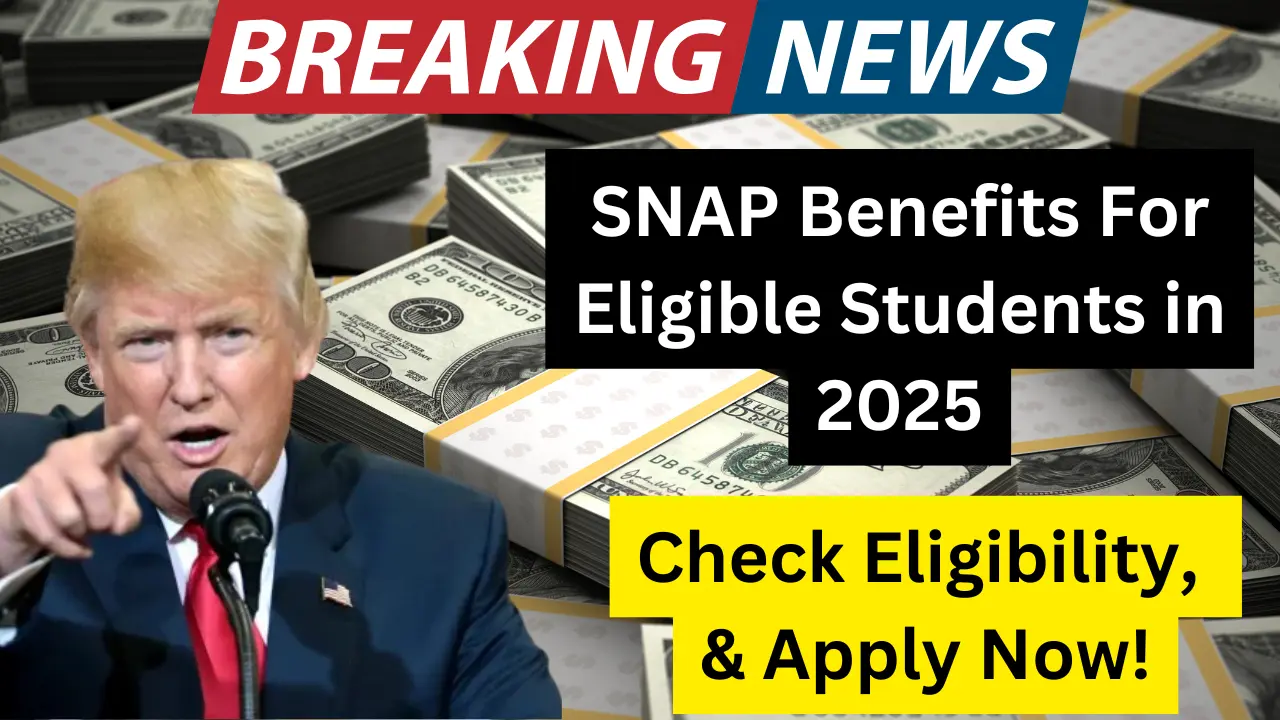As the cost of living and college tuition continue to rise, many students face financial challenges that can affect both their education and well-being. For those struggling with food insecurity, understanding and accessing available resources is critical.
In 2025, the Supplemental Nutrition Assistance Program (SNAP)—commonly known as Food Stamp Benefits—provides essential support to eligible college students, helping them maintain a healthy diet while pursuing their academic goals.
This article outlines the most important information for students, including eligibility requirements, the application process, and key dates. Whether you’re a first-year student or returning to school, knowing how to access SNAP can significantly improve your college experience.
SNAP Benefits For Eligible Students in 2025 Overview
The following table summarizes the key points and deadlines based on the latest government guidance:
| Category | Details |
| Enrollment Requirement | Must be enrolled at least half-time at an institution of higher education. |
| Income Eligibility | Household income must be below 130% of the federal poverty level. |
| Asset Limit | Standard asset limit is $2,750 (higher limits may apply for elderly or disabled household members). |
| Work Requirement | Generally must work 20+ hours per week or be in a work-study/training program; some exemptions apply (e.g., parents). |
| Meal Plan Exception | Students receiving a meal plan covering more than half their meals (typically in dorms) are ineligible for SNAP. |
| Application Process | Apply through your state SNAP agency (applications are processed where you live). |
| Decision Timeline | Eligibility decisions must be made within 30 days of application (7 days for expedited cases). |
| Right to a Fair Hearing | If denied, you can request a fair hearing within 90 days of the decision. |
What is SNAP and Who Is Eligible?
SNAP is a federally funded program that helps low-income individuals and families supplement their grocery budgets. In 2025, college students enrolled at least half-time in an institution of higher education (colleges, universities, trade, or technical schools) may qualify for SNAP if they meet both financial and non-financial requirements.

Eligibility Criteria For Food Stamp Benefits
- Enrollment Status:
- Students must be enrolled at least half-time in a postsecondary institution.
- Full-time students generally qualify, though some additional criteria may apply.
- Income Limits:
- Student households must have incomes below 130% of the federal poverty level.
- This calculation includes income from part-time jobs, work-study, and other earnings. (Note: Grants and scholarships typically are not counted.)
- Asset Limits:
- The standard asset limit for most households is $2,750, although higher limits may apply for households with an elderly member (60+) or someone with a disability.
- Work Requirements and Exemptions:
- Most students between the ages of 18 and 49 must meet work requirements (for example, working at least 20 hours a week or participating in a work-study program).
- Exemptions are available for students who are parents, pregnant, receive Temporary Assistance for Needy Families (TANF), participate in approved job training, or who are under 18 or over 49.
Follow These Steps to Apply for SNAP Benefits
Step 1: Determine Your Eligibility
- Self-Assessment: Use online eligibility tools provided by your state SNAP agency to check if you qualify based on income, assets, and enrollment status.
Step 2: Gather Required Documentation
- Identification: Driver’s license or state ID.
- Social Security Number: Your Social Security card or number.
- Proof of Enrollment: Class schedule or acceptance letter from your institution.
- Income Verification: Recent pay stubs, tax returns, or other income documents.
- Asset Information: Recent bank statements or proof of other assets.
Step 3: Submit Your Application
- Application Submission: Most states offer online or mobile applications. Apply through your state SNAP agency website.
- Interview Process: You may be required to participate in an interview (often conducted over the phone) to verify your information.
Step 4: Receive Your Benefits
- EBT Card: Once approved, benefits are loaded onto an Electronic Benefits Transfer (EBT) card, which works like a debit card at participating retailers.
Additional Resources and Support
- State SNAP Offices: Contact your local SNAP office for detailed information on applications and eligibility.
- Campus Food Pantries: Many colleges offer food pantries for students facing food insecurity.
- Student Support Services: Your institution’s student services office can help guide you through the SNAP application process.
- Online Information: Visit the USDA Food and Nutrition Service website for further details.
Final Thoughts
SNAP benefits can play a crucial role in ensuring that college students have access to nutritious food, allowing them to focus more on their studies and personal development.
| Homepage | https://uhmychart.org/ |
In 2025, if you meet the eligibility requirements, be sure to take advantage of this program. Staying informed about your rights and the resources available to you can make a significant difference in your college experience.
For any questions or further assistance, contact your local SNAP agency or your institution’s student support services.
By staying informed and taking timely action, you can secure the help you need to succeed academically while maintaining a healthy lifestyle.
FAQs About SNAP Benefits For Eligible Students : –
Can I receive SNAP if I am living with my parents?
Generally, A SNAP “Household” consists of anyone who lives together and prepares food together.
Your eligibility for SNAP Benefits will be determined together as a group and compared with SNAP program income eligibility limit.
Can I be eligible for a Food Stamp If I am Using a meal plan?
If you live in a dorm and have a meal plan covering more than half of your meals, you will not be eligible for SNAP benefits.
How do I verify if I meet an exemption?
If you are meeting an exemption then you will need to show your documentation that meets an exemption.






